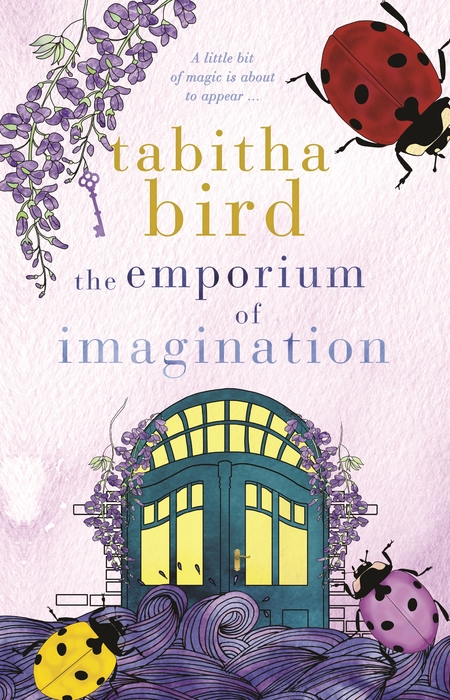You not immediately think to link a viral sensation Disney + series with an Australian writer who calls Boonah, Queensland home, but as you soak yourself in the healing balm that is Tabitha Bird’s The Emporium of Imagination, which deals with grief in one of the creative and soul restorative ways you will come across, it is hard not to recall one particularly resonant phrase from WandaVision which carries a comforting echo on Bird’s latest novel:
“But what is grief, if not love persevering?”
It is said by Vision to Wanda as the latter struggles to deal with the crushing of grief immeasurable, an wave of emotion so strong and destructive that Wanda has gone to immense lengths to keep it at bay.
No one in The Emporium of Imagination goes to quite the lengths of Wanda in forestalling the spiralling descent into the often ravagingly exhaustive abyss of grief, but thirty-something Ann, who is nursing her beloved Nannie through the end stages of cancer and ten-year-old Enoch, who is mourning the loss of his dependable, fun, caring dad, Isaac, are all just as caught in its grip as Wanda and indeed anyone who has ever lost someone near and dear to them.
In fact, Bird, who says the novel grew from seeing her own Nannie through the final stages of a terminal disease, gives voice to grief in ways that few novels have ever done by admitting up front that its passage is nowhere as smooth or obvious as everyone likes to think.
While many people are inclined to treat grief as a brisk, linear process that begins with great loss, tsunamis through a funeral and the agonising weeks and months of physical and emotional dislocation that follow – what is normal? Does it even exist anymore, and if it does, how can it exist without that person around to give its presence and life, form and shape? – and the ebbs away to business as usual, anyone who has ever truly faced up to its full extent knows that it’s far more than a neat psychological tour through the very worst of times.
“When I open my eyes, I [Ann] am even more in love with The Emporium. That it is not a dream that slips away with wakefulness. If I could hug it, I would. Perhaps we really don’t need an antidote for grief. Just a way to work through it. In our time, and at our own pace.
And so it begins, I think. The store is opened.” (P. 165)
But that is the key thing in The Emporium of Imagination – grief doesn’t just appear, run its messy course and then slip quietly out the door from whence it came, leaving neatly closed wounds in its wake.
Were that it did; but as the characters in this luminously alive and wondrously imaginative book know all too well, there is nothing neat or easy or easily-charted about grief, assuming of course that you even acknowledge its presence in the first place.
Neither Ann nor Enoch, who are tangentially connected in the town of Boonah, west of Queensland’s capital, Brisbane, are willing to admit that it is within them, around them and that it has totally changed the trajectory and feel of their lives.
It is only when the flamboyantly-named Earlatidge Hubert Umbray, custodian of the gloriously magical Emporium of Imagination which just appears in its chosen town without warning and fills itself with all the things and connections with people its grief-ravaged people need, arrives in Boonah that Ann and Enoch can finally admit that the grief they carry is weighing them in ways they can’t even articulate.
If this is all makes The Emporium of Imagination sounds desperately sad and weighted down with sadness and darkness unimaginable, don’t fret; the novel is actually gorgeously alive with the possibility of love enduring, of hope springing forth and life being marvellously and perfectly reborn even as you grapple with the horrors of pain, loss and the lingering, cloying aftereffects of grief which clearly do not come with a time limit.
Drawing on an imagination that be vast and infinitely able to project far beyond the mortal realms of our often banal world, Bird evokes a palpable sense of wonder whenever the vintage gift-filled Emporium is doing its idiosyncratically healing thing.
The way she describes its furtive but wondrous arrival in Boonah and its sudden appearance on a spare block in the main street is magical enough but then to hear how it is filed with flower-filled meadows, and food capable of evoking emotions, memories and journeys to impossible but necessary places and times, and telephones which offer one last special call to someone long lost, is soul dazzling and heartwarming in ways so deeply impactful that you can help but feel like someone has reached deep in your grief-scarred soul and reminded it how beautifully transportive and expansive life can be.
That’s one of its greatest gifts – it never stints on being honest about how terrible it is to lose someone you love and how the emotional wrench their departure from your life stays with you long after everyone else thinks it should be there, but it is also just as upfront about you can be lifted up from the very depths of grief back to a place where life speaks to you again and you can see a way forward from the dark places you have been.
“Those days I remember are gone, but I am still holding on. And perhaps that’s okay? To hold on. But also, to let go?
Sitting in the car with no one around, I decide to do both.
My heads rests on the steering wheel. And I cry. Silent shy tears and the big gulps that have me gasping.
I’m crying for her, for all those silly, happy days. But that’s just it, isn’t it? Leaning into my grief means I also get to remember all the good stuff.
And Earlatidge is right again. I don’t want anyone to take this grief from me. It’s precious. A sad-happy mix that means I have loved. That I do love still. (P. 210)
The Emporium of Imagination is that rare and astoundingly wonderful book that balances how grim life can be with how upliftingly alive it can be too.
As Ann and Enoch come to grips with their respective losses, but also come to realise that there may be something to gain too, something beyond their imagination and as impossibly wonderful as the Emporium itself, we are also taken on a journey with Earlatidge who suddenly discovers he is dying and that he will need to face up to his own tragic past if he is to have any peace in the next.
The beauty of this exquisitely well-written book, which is both magically real and light and substantially weighty and affecting too, is that speaks to the idea that another life is possible after the heaviness of grief has fallen on you.
If you have ever struggled to get back up after great loss, as this reviewer has since losing both parents within three years of each other, you will see much of your own journey in these imaginatively wrought but insightfully grounded pages which admit that death often takes a devastatingly big bite out of life such that you wonder if the wound will ever heal, but that with or without the presence of The Emporium of Imagination in your life, you can rise back to a life worth the living, and while it may not look like the one you lost, it might, in its own magically alive way, take you places you thought had long ceased to be within the realm of possibility.

